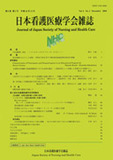Japanese
English
- 有料閲覧
- Abstract 文献概要
- 参考文献 Reference
要旨
本研究は予防的手術を受けた無症候性脳血管障害患者の病気体験がもたらした意味を探究することを目的とした。対象は合併症を残さなかった13名の無症候性未破裂脳動脈瘤患者であり、データ分析は質的帰納的方法で行った。分析の結果、患者の多くは手術を終え合併症を起こさなかった事を知覚できた時期に病気(病者)からの解放と自由を実感していた。この感覚を前提として、病気体験がもたらした意味は≪運命的試練≫≪転換≫≪自己開放≫≪希望・期待≫の4つのカテゴリーで捉えることができた。患者は病気体験を≪運命的試練≫と捉え、目に見えない何かに導かれた体験と理解する一方で、それを乗り越えることで人として成長でき、本来の自信を回復させていた。そして、自己を振り返ることで生き方や価値観、あるいは健康観を≪転換≫させていた。さらに、期待どおりの手術結果は患者に満足感と達成感をもたらし、あらためて自己の存在価値を認め、生きられることを素直に感謝するなど、自由で豊かな感情を表現できる≪自己開放≫という内的な変化をもたらしていた。また、患者は改めて自分の人生設計を思い描き、継続する社会的役割責任や病気体験者としての役割に対し、個人的な≪希望・期待≫を抱き再び人生を踏み出していた。これら4つのカテゴリーは時間軸で説明できるのもではなく、同時的に関連しあっており、それは将来へ向かう広がりを含んだ意味と捉えることができた。
Abstract
The purpose of this study was to investigate the meaning of illness for patients with asymptomatic cerebrovascular diseases who underwent preventive surgery. The interview data of 13 patients were analyzed qualitatively. These patients had asymptomatic unruptured intracranial aneurysms but no complications after the operation. The analysis showed that most of the patients felt postoperative relief from their experience of illness because there were no complications. I also found that the patients were able to view their experience positively. These views comprised of "destined trial", "change of view", "opened-self", and "hopes".
"Destined trial" means that patients expressed their personal growth and recovery of their confidence as a result of overcoming distress. "Change of view" means that they changed their way of living and their evaluation of health in their lived experience. "Opened self" consists of feelings of satisfaction and sense of achievement, a renewed sense of self-value, and gratitude for being alive. "Hope" means that they had expectations for the future by rethinking their future life, maintaining their social role, and sharing their personal experience of illness. These categories are not able to identify the time process, but interrelated among them. And they involve meaning that expands into the future.
Copyright © 2004, Japan Society of Nursing and Health Care All rights reserved.


